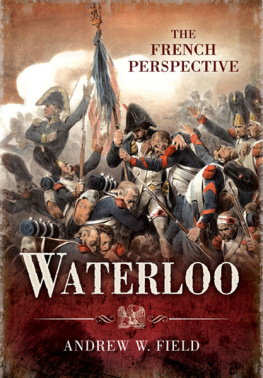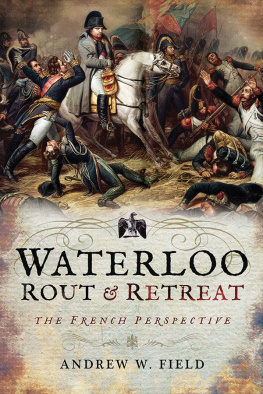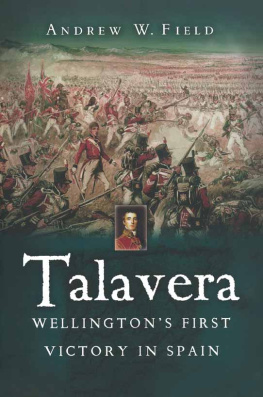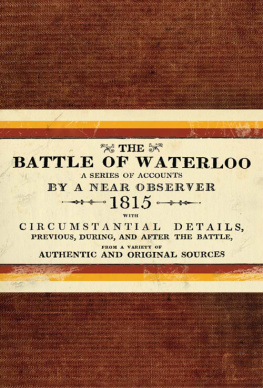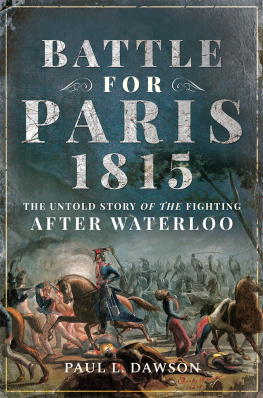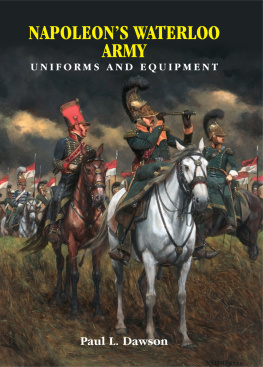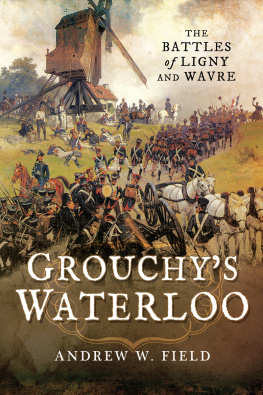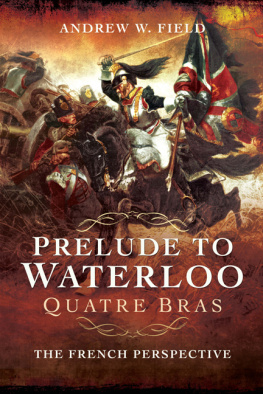To my three special children,
Katie, Charlotte and Thomas
First published in Great Britain in 2012 by
Pen & Sword Military
an imprint of
Pen & Sword Books Ltd
47 Church Street
Barnsley
South Yorkshire
S70 2AS
Copyright Andrew W. Field 2012
ISBN: 978-1-78159-043-0
PDF ISBN: 978-1-78337-437-3
EPUB ISBN: 978-1-78159-998-3
PRC ISBN: 978-1-78159-999-0
The right of Andrew W. Field to be identified as Author of this Work has been asserted by him in accordance with the Copyright, Designs and Patents Act 1988.
A CIP catalogue record for this book is
available from the British Library.
All rights reserved. No part of this book may be reproduced or transmitted in any form or by any means, electronic or mechanical including photocopying, recording or by any information storage and retrieval system, without permission from the Publisher in writing.
Typeset in 10.5/12 Ehrhardt by Concept, Huddersfield, West Yorkshire
Printed and bound by CPI Group (UK) Ltd, Croydon, CRO 4YY
Pen & Sword Books Ltd incorporates the Imprints of Pen & Sword Aviation, Pen & Sword Family History, Pen & Sword Maritime, Pen & Sword Military, Pen & Sword Discovery, Wharncliffe Local History, Wharncliffe True Crime, Wharncliffe Transport, Pen & Sword Select, Pen & Sword Military Classics, Leo Cooper, The Praetorian Press, Remember When, Seaforth Publishing and Frontline Publishing.
For a complete list of Pen & Sword titles please contact
PEN & SWORD BOOKS LIMITED
47 Church Street, Barnsley, South Yorkshire, S70 2AS, England
E-mail:
Website: www.pen-and-sword.co.uk
Contents
Section One
Setting the Scene
Section Two
Prelude to Battle
Section Three
11.30am to 1.30pm
Section Four
1.30pm to 3.30pm
Section Five
3.30pm to 6.00pm
Section Six
6.00pm to 8.00pm
Section Seven
8.00pm to 1.00am
Section Eight
Tactical Notes
Section Nine
Summary: The French Perspective
List of Maps
List of Illustrations
Preface
I have been a soldier all my life. This work has been born out of my abiding interest in the Napoleonic Wars and the armies of Napoleon. Long hours of archive study are not conducive to a military career and family life, so I have indulged my hobby by acquiring as many of the memoirs and first-hand accounts as possible. Those I have not been able to find on second-hand book websites (try www.abebooks.co.uk) or Ebay (French and Belgian sites), I have been delighted to access in the British Library. As I have deliberately tried to present a fighters view of the battle, as far as possible I have avoided official reports from senior officers.
Virtually all French translations are my own and I take full responsibility for any errors. I have tried to retain the feel and authenticity of the originals rather than to try and bring them into modern English parlance.
I do not have a long list of eminent academics or historians to thank, as both the research and the writing has been very much my own work. However, I would like to thank the commissioning editor at Pen & Sword, Rupert Harding, who has waited patiently through the many years it has taken me to write this, taking into account my military career, including a sojourn in Afghanistan, and the time it has taken me to collect the sources and translate them all. Thanks also to my partner, Mandy, who despite having her weekends wrecked for the last six months has encouraged me to finish the work. Her son, Jeff, did the excellent maps even as he travelled around the world. Last, but not least, thanks to Louise, who diligently ensured that no animals were injured in the preparation of this book.
So here is the faithful picture of the battlefield, chosen by Wellington, and from where, as we have said, he appeared to defy his adversaries, who, by the lack of foresight of their headquarters, committed the fault of attacking the bull by the horns. In the numerical inferiority of our troops, the little time that we had before the arrival of the Prussians, and, above all, having to fight an enemy who leaves little to fate, it would have been preferable to force him to manoeuvre rather than to leave him to fight on ground of his own choosing.
But it seems that inevitability always dragged us along and led us to throw ourselves with a light heart into the abyss, and we repeat, to attack the English bull by the horns. Indeed, it is noticeable that from Agincourt to Waterloo, nearly all the battles in which the English have beaten us have been defensive battles. We attack with lowered heads against their formidable positions, prepared in advance, that they know how to defend marvellously. One could say that we endeavour to fight precisely the type of battle that is best suited to their way of fighting: witness in recent times, Vimeiro, Talavera, Bussaco, Salamanca and Waterloo, which might not even have been fought if the English army had been beaten on the 16th, as it would have been if it hadnt been for the military foolishness of that day. Indeed, either because of their character, their military talent; or the spirit of their government, which imposes great caution on their commanders, it is clear that the English are not as capable of offensive operations as defensive. Unless enjoying a great superiority of forces, as at Toulouse, or of absolute necessity such as at Alkmar, they find it difficult to take the initiative and to attack. Wellington is certainly not a general of science or inspiration, but he is a brave soldier and knows how to find remarkable defensive positions from unpromising ground. He has a cool temperament and an excellent army that has admirable order in all senses of the word; in the organisation of equipment, and in general and individual solidity, which fights tenaciously on the strong ground where it is established. Making use of these qualities, it displayed to us a most admirable appearance.
Sergeant Hippolyte de Mauduit, Chevalier de la Lgion dHonneur, 2nd Battalion of the 1st Regiment of Foot Grenadiers of the Imperial Guard.
Introduction
I wonder how many books on Waterloo I have read in which the author begins by trying to justify why he has produced another. Whilst as a British soldier it would be somewhat incongruous to accuse me of being a Francophile, I am, however, a member of what must be a rather rare breed; a British soldier with a fascination for Napoleons Grande Arme, and this may partially explain my own attempt to bring a new perspective on what is almost certainly the most famous and most written-about battle in history.
Waterloo was a unique battle in many ways and no doubt this is one of the reasons it is considered so interesting. Not only did it see the final defeat of one of the greatest military leaders of all time, and the end of his controversial rule, but it was also the first (and of course only) time that Wellington and Napoleon faced each other on the battlefield. Whats more, the battle resulted in the almost unprecedented total collapse of one of the protagonists. Napoleon had achieved many memorable and decisive victories during his military career but of these Austerlitz, Jena and Friedland only Jena comes close to featuring the same total, if temporary, rout and disintegration of the losers army as at Waterloo.
But perhaps one of the greatest fascinations of this battle is that so much controversy still surrounds it: the fight for Hougoumont, dErlons attack, the unsupported French cavalry charges, the attack of the Imperial Guard, the decisiveness of the Prussian intervention, Grouchys non-appearance and the effectiveness of Napoleons own performance are all still much debated. I suspect only a few of you will have noticed that five out of six of these points of contention are focussed on the French role in the battle, rather than the allied.
Next page
